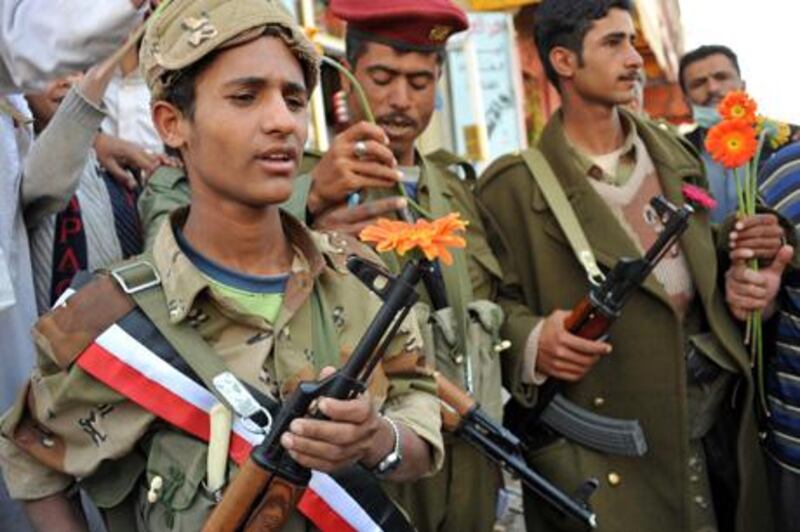SANA'A // Yemen's embattled president yesterday agreed to a five-point platform of demands including his resignation by the end of the year, but was quickly rebuffed by a confident opposition who say they now want his immediate removal.
Opposition leaders said yesterday that it was too late to comply with the plan they had put to the president on March 4 - he should resign immediately.
The move was complicated by a state of emergency vote in parliament that opposition MPs decried as illegal, but that may nonetheless give Ali Abdullah Saleh sweeping powers to clamp down on protests that have escalated since the killing of at least 50 demonstrators last Friday.
In a letter released yesterday, Mr Saleh said Yemen needed to avoid violence that would "leave the country facing a dangerous fate". The letter was given to his opponents in a bid to reconcile differences.
He offered constitutional change and elections to replace parliament and the head of state this year.
The state Saba news agency reported yesterday that Mr Saleh accepted a proposal from the Joint Meeting Parties (JMP), an opposition coalition of six parties, that he resign by the end of the year.
"President Saleh accepted the five-point conciliation initiative presented by the opposition earlier in order to end the political deadlock in the country," Saba reported, quoting an unnamed government official.
The five-point plan includes electoral and constitutional reforms, and compensation for victims of violence during the protests.
Weeks of protests against the 33-year rule of Mr Saleh have worried western leaders, who view him as an ally against al Qa'eda.
In Cairo, the US defence secretary, Robert Gates, said it was too soon to determine the result of the turmoil in Yemen. "I think it's too soon to call an outcome. We've had a good working relationship with President Saleh. He's been an important ally in the counter-terrorism arena."
Also yesterday, in a chaotic parliamentary session that lasted about three hours, 164 MPs voted in favour of the state of emergency declaration, according to Sultan al Barakani, head of the ruling General People's Congress bloc.
However, a source at the secretariat of the parliament said on condition of anonymity that only 131 MPs attended the session of the 301-seat parliament. At least four MPs abstained from voting.
To take effect, the bill needed the approval of a majority in parliament and a quorum of more than 50 per cent.
"What they had done to pass the state of emergency is fraud and we reject it," said Abdul Razaq al Hajri of the Islamist opposition Al-Islah (Reform) party.
The parliamentary opposition, independent MPs and members of Mr Saleh's own General People's Congress who have resigned all boycotted the session.
The state of emergency would suspend the constitution, ban protests and allow for arbitrary arrests and censorship. It also allows the establishment of emergency courts.
Addressing the vote, Ahmed Sofan, an MP and former deputy prime minister, abstained and lashed out at the interior ministry and other security agencies for last Friday's deaths.
"The perpetrators should be held accountable and the people should know the reality about what happened … we must immediately ask the prosecution to interrogate the interior minister and other security officials for failing in arresting and presenting the perpetrators to justice," Mr Sofan said.
While the MPs loyal to Mr Saleh were voting on the state of emergency, the opposition, independent and defecting MPs were joining anti-Saleh protests in several cities.
"The parliament is not eligible to discuss the state of emergency announcement. The legitimacy is now with the masses of protesters who are calling for an immediate end to the regime," said Abdu Bishr, a defecting MP amid thousands of protesters in Sana'a yesterday.
Mohammed al Sabri, an opposition leader, said yesterday the president had to leave immediately.
"The plan was not ours only, but came after discussions with clerics and tribal chiefs at the time," Mr al Sabri said.
The plan called for parliament to be elected first, and then form a government, which would organise the presidential vote, Saba said.
The plan, which the JMP offered earlier this month, asked Mr Saleh to draft a timetable for transferring power peacefully. Mr Saleh initially rejected the plan and said he would step down when his term ended in 2013.
The plan also called for the prosecution of police and members of the security forces responsible for the deaths and injuries of protesters, as well as compensation for those wounded, and for the families of those killed.
At least 102 people were killed and about 2,000 injured in several weeks of protests, according to human rights groups.
The plan called for amending the country's constitution, rewriting election law to ensure fair representation in parliament, removing Mr Saleh's relatives from leadership positions in the army and security forces, and guaranteeing the right to peaceful protest.
Mr Saleh gave a dire warning on Tuesday that civil war loomed. Hundreds of military leaders, businessmen, MPs, diplomats and government officials declared their support for the revolution after the defection on Monday of Major General Ali Mohsen al Ahmar, the commander of the army's 1st Armoured Division.
Arab League representatives meeting in Cairo on Tuesday condemned "crimes against civilians" in Yemen and urged the Yemeni government to deal with the people's demands in a "peaceful manner".






